Ethics and Professionalism in Financial Planning
VerifiedAdded on 2022/12/30
|15
|5445
|38
AI Summary
This document discusses the importance of ethics and professionalism in financial planning. It explores the concept of ethical decision making and identifies a barrier to ethical decision making called partisanship. The document also examines the compliance of BGFS advisers with Standard 5 and Standard 12 of the FASEA Code of Ethics in their dealings with clients. Additionally, it discusses Bianca's compliance with the value of honesty in the FASEA Code of Ethics. The document further explores a potential ethical issue that may arise from Daniel's and Kelly's minimal knowledge or experience with investing and overall disinterest in their financial plan. It concludes by discussing the obligations under the FASEA Code of Ethics to implement advice that is in Daniel's and Kelly's best interests.
Contribute Materials
Your contribution can guide someone’s learning journey. Share your
documents today.
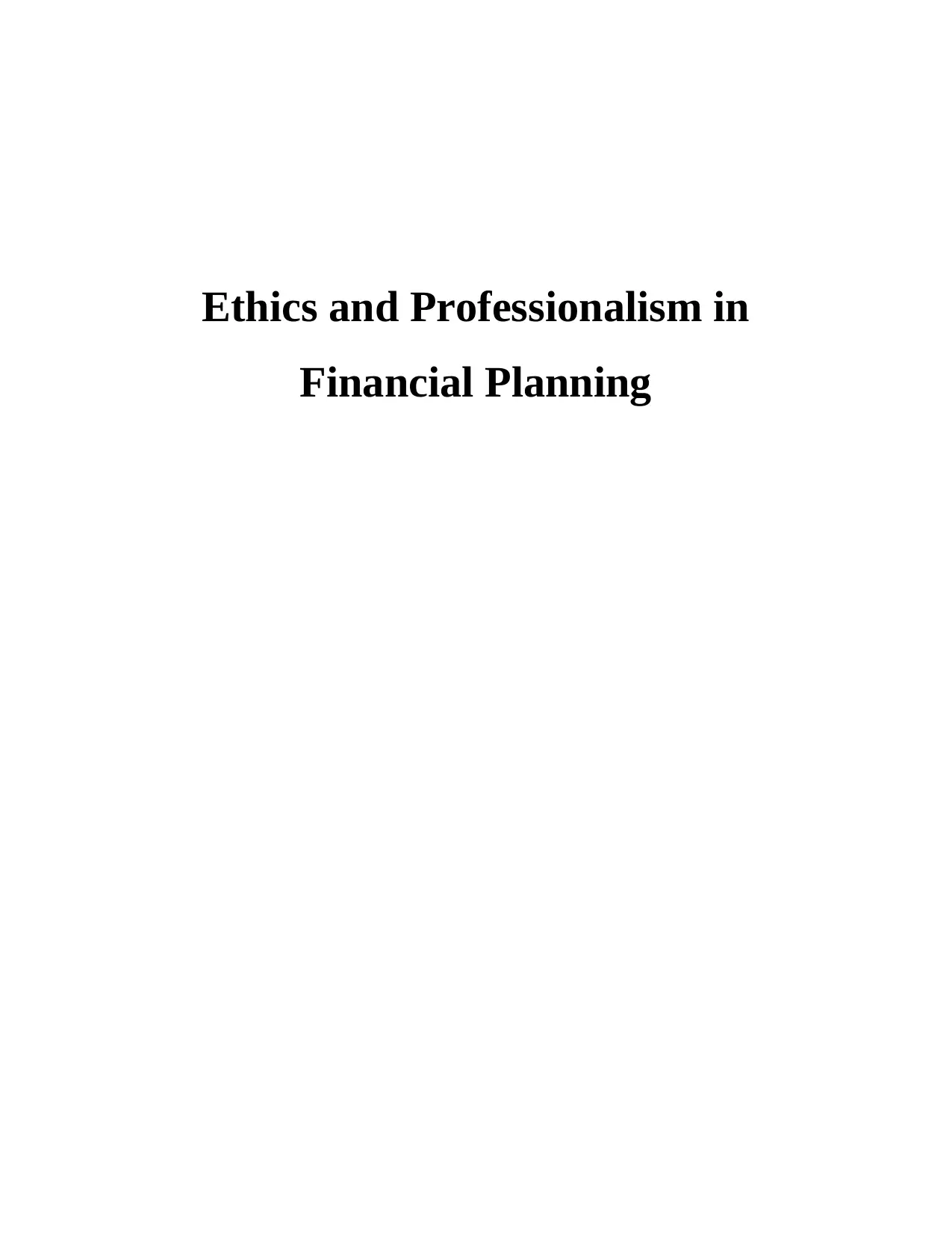
Ethics and Professionalism in
Financial Planning
Financial Planning
Secure Best Marks with AI Grader
Need help grading? Try our AI Grader for instant feedback on your assignments.
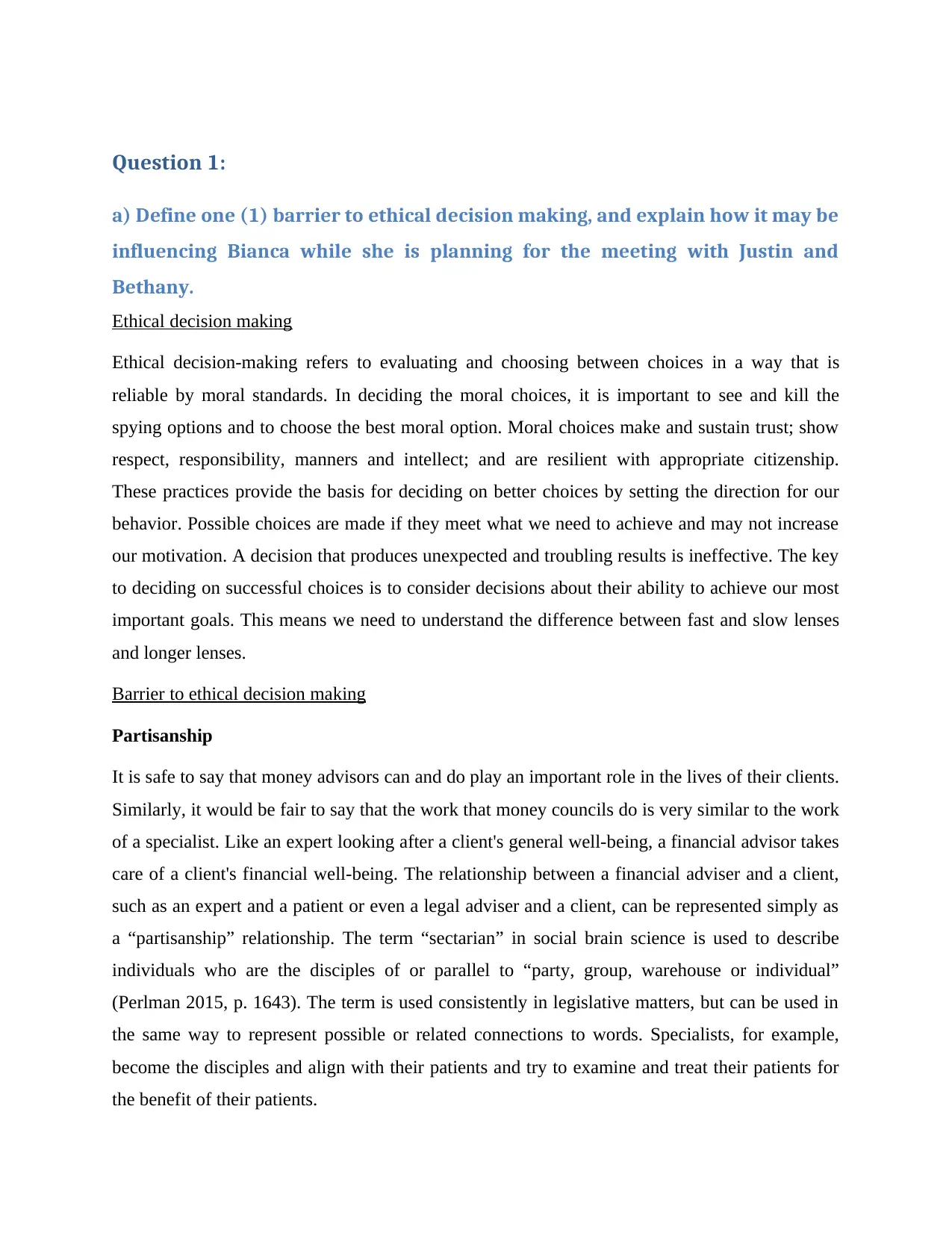
Question 1:
a) Define one (1) barrier to ethical decision making, and explain how it may be
influencing Bianca while she is planning for the meeting with Justin and
Bethany.
Ethical decision making
Ethical decision-making refers to evaluating and choosing between choices in a way that is
reliable by moral standards. In deciding the moral choices, it is important to see and kill the
spying options and to choose the best moral option. Moral choices make and sustain trust; show
respect, responsibility, manners and intellect; and are resilient with appropriate citizenship.
These practices provide the basis for deciding on better choices by setting the direction for our
behavior. Possible choices are made if they meet what we need to achieve and may not increase
our motivation. A decision that produces unexpected and troubling results is ineffective. The key
to deciding on successful choices is to consider decisions about their ability to achieve our most
important goals. This means we need to understand the difference between fast and slow lenses
and longer lenses.
Barrier to ethical decision making
Partisanship
It is safe to say that money advisors can and do play an important role in the lives of their clients.
Similarly, it would be fair to say that the work that money councils do is very similar to the work
of a specialist. Like an expert looking after a client's general well-being, a financial advisor takes
care of a client's financial well-being. The relationship between a financial adviser and a client,
such as an expert and a patient or even a legal adviser and a client, can be represented simply as
a “partisanship” relationship. The term “sectarian” in social brain science is used to describe
individuals who are the disciples of or parallel to “party, group, warehouse or individual”
(Perlman 2015, p. 1643). The term is used consistently in legislative matters, but can be used in
the same way to represent possible or related connections to words. Specialists, for example,
become the disciples and align with their patients and try to examine and treat their patients for
the benefit of their patients.
a) Define one (1) barrier to ethical decision making, and explain how it may be
influencing Bianca while she is planning for the meeting with Justin and
Bethany.
Ethical decision making
Ethical decision-making refers to evaluating and choosing between choices in a way that is
reliable by moral standards. In deciding the moral choices, it is important to see and kill the
spying options and to choose the best moral option. Moral choices make and sustain trust; show
respect, responsibility, manners and intellect; and are resilient with appropriate citizenship.
These practices provide the basis for deciding on better choices by setting the direction for our
behavior. Possible choices are made if they meet what we need to achieve and may not increase
our motivation. A decision that produces unexpected and troubling results is ineffective. The key
to deciding on successful choices is to consider decisions about their ability to achieve our most
important goals. This means we need to understand the difference between fast and slow lenses
and longer lenses.
Barrier to ethical decision making
Partisanship
It is safe to say that money advisors can and do play an important role in the lives of their clients.
Similarly, it would be fair to say that the work that money councils do is very similar to the work
of a specialist. Like an expert looking after a client's general well-being, a financial advisor takes
care of a client's financial well-being. The relationship between a financial adviser and a client,
such as an expert and a patient or even a legal adviser and a client, can be represented simply as
a “partisanship” relationship. The term “sectarian” in social brain science is used to describe
individuals who are the disciples of or parallel to “party, group, warehouse or individual”
(Perlman 2015, p. 1643). The term is used consistently in legislative matters, but can be used in
the same way to represent possible or related connections to words. Specialists, for example,
become the disciples and align with their patients and try to examine and treat their patients for
the benefit of their patients.
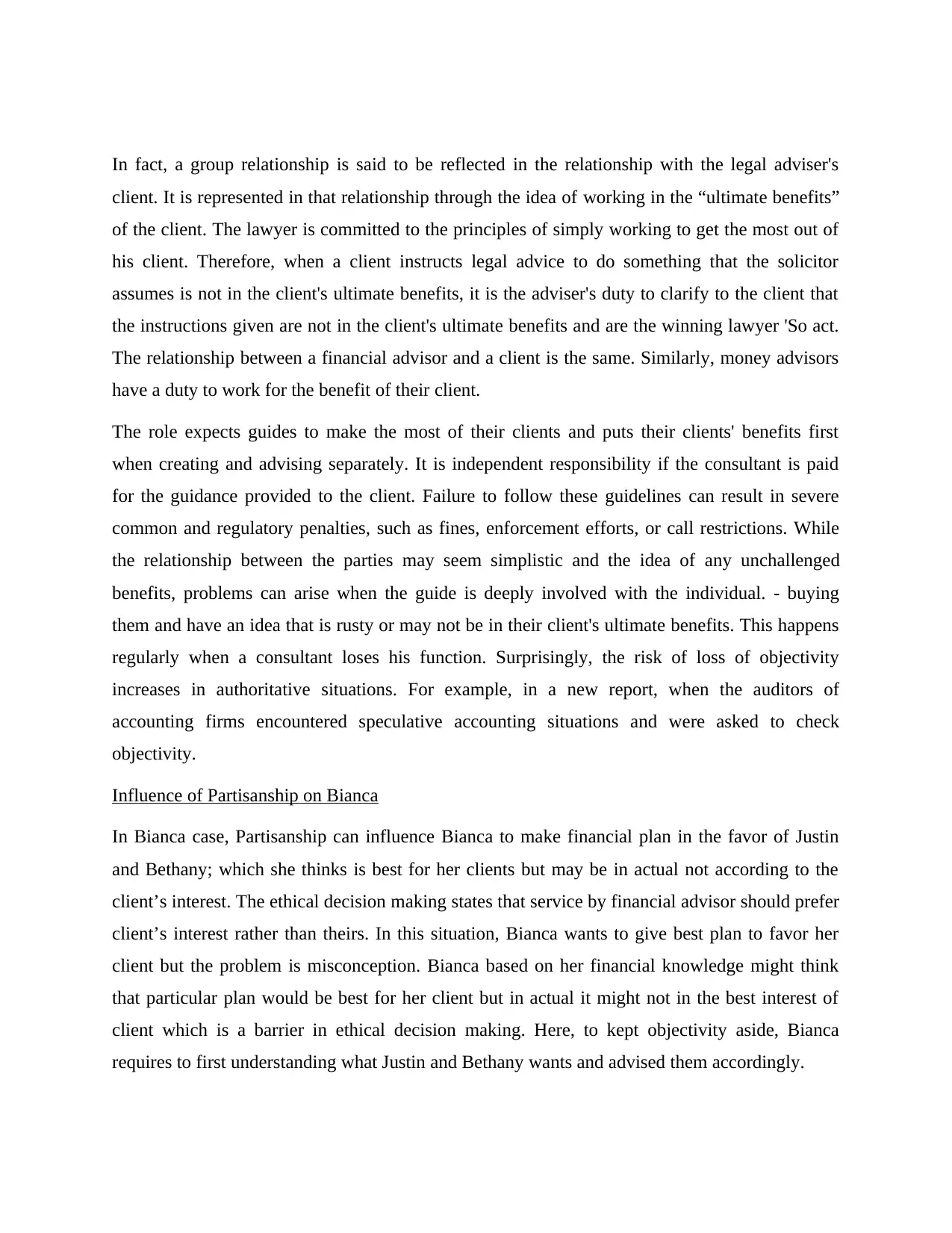
In fact, a group relationship is said to be reflected in the relationship with the legal adviser's
client. It is represented in that relationship through the idea of working in the “ultimate benefits”
of the client. The lawyer is committed to the principles of simply working to get the most out of
his client. Therefore, when a client instructs legal advice to do something that the solicitor
assumes is not in the client's ultimate benefits, it is the adviser's duty to clarify to the client that
the instructions given are not in the client's ultimate benefits and are the winning lawyer 'So act.
The relationship between a financial advisor and a client is the same. Similarly, money advisors
have a duty to work for the benefit of their client.
The role expects guides to make the most of their clients and puts their clients' benefits first
when creating and advising separately. It is independent responsibility if the consultant is paid
for the guidance provided to the client. Failure to follow these guidelines can result in severe
common and regulatory penalties, such as fines, enforcement efforts, or call restrictions. While
the relationship between the parties may seem simplistic and the idea of any unchallenged
benefits, problems can arise when the guide is deeply involved with the individual. - buying
them and have an idea that is rusty or may not be in their client's ultimate benefits. This happens
regularly when a consultant loses his function. Surprisingly, the risk of loss of objectivity
increases in authoritative situations. For example, in a new report, when the auditors of
accounting firms encountered speculative accounting situations and were asked to check
objectivity.
Influence of Partisanship on Bianca
In Bianca case, Partisanship can influence Bianca to make financial plan in the favor of Justin
and Bethany; which she thinks is best for her clients but may be in actual not according to the
client’s interest. The ethical decision making states that service by financial advisor should prefer
client’s interest rather than theirs. In this situation, Bianca wants to give best plan to favor her
client but the problem is misconception. Bianca based on her financial knowledge might think
that particular plan would be best for her client but in actual it might not in the best interest of
client which is a barrier in ethical decision making. Here, to kept objectivity aside, Bianca
requires to first understanding what Justin and Bethany wants and advised them accordingly.
client. It is represented in that relationship through the idea of working in the “ultimate benefits”
of the client. The lawyer is committed to the principles of simply working to get the most out of
his client. Therefore, when a client instructs legal advice to do something that the solicitor
assumes is not in the client's ultimate benefits, it is the adviser's duty to clarify to the client that
the instructions given are not in the client's ultimate benefits and are the winning lawyer 'So act.
The relationship between a financial advisor and a client is the same. Similarly, money advisors
have a duty to work for the benefit of their client.
The role expects guides to make the most of their clients and puts their clients' benefits first
when creating and advising separately. It is independent responsibility if the consultant is paid
for the guidance provided to the client. Failure to follow these guidelines can result in severe
common and regulatory penalties, such as fines, enforcement efforts, or call restrictions. While
the relationship between the parties may seem simplistic and the idea of any unchallenged
benefits, problems can arise when the guide is deeply involved with the individual. - buying
them and have an idea that is rusty or may not be in their client's ultimate benefits. This happens
regularly when a consultant loses his function. Surprisingly, the risk of loss of objectivity
increases in authoritative situations. For example, in a new report, when the auditors of
accounting firms encountered speculative accounting situations and were asked to check
objectivity.
Influence of Partisanship on Bianca
In Bianca case, Partisanship can influence Bianca to make financial plan in the favor of Justin
and Bethany; which she thinks is best for her clients but may be in actual not according to the
client’s interest. The ethical decision making states that service by financial advisor should prefer
client’s interest rather than theirs. In this situation, Bianca wants to give best plan to favor her
client but the problem is misconception. Bianca based on her financial knowledge might think
that particular plan would be best for her client but in actual it might not in the best interest of
client which is a barrier in ethical decision making. Here, to kept objectivity aside, Bianca
requires to first understanding what Justin and Bethany wants and advised them accordingly.
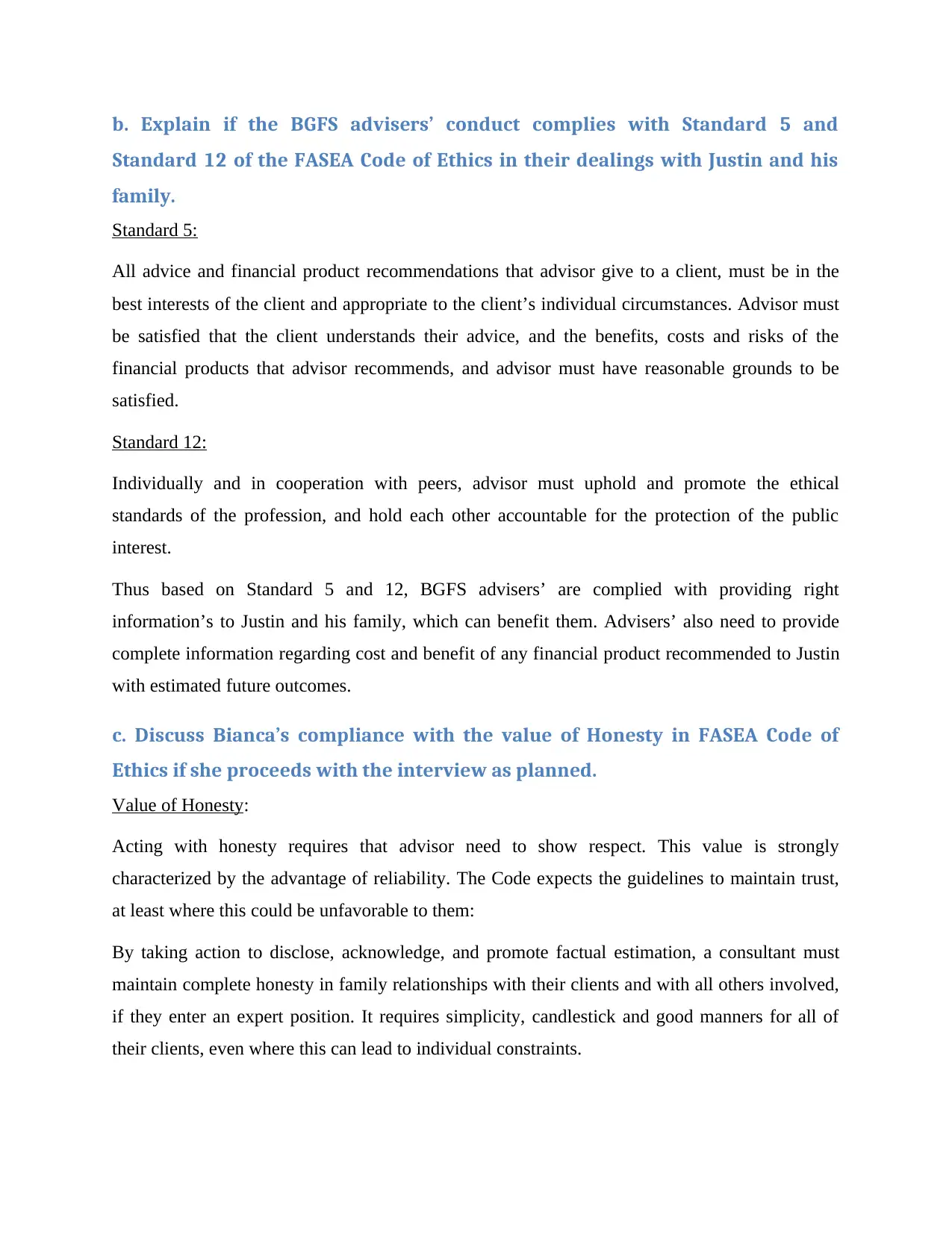
b. Explain if the BGFS advisers’ conduct complies with Standard 5 and
Standard 12 of the FASEA Code of Ethics in their dealings with Justin and his
family.
Standard 5:
All advice and financial product recommendations that advisor give to a client, must be in the
best interests of the client and appropriate to the client’s individual circumstances. Advisor must
be satisfied that the client understands their advice, and the benefits, costs and risks of the
financial products that advisor recommends, and advisor must have reasonable grounds to be
satisfied.
Standard 12:
Individually and in cooperation with peers, advisor must uphold and promote the ethical
standards of the profession, and hold each other accountable for the protection of the public
interest.
Thus based on Standard 5 and 12, BGFS advisers’ are complied with providing right
information’s to Justin and his family, which can benefit them. Advisers’ also need to provide
complete information regarding cost and benefit of any financial product recommended to Justin
with estimated future outcomes.
c. Discuss Bianca’s compliance with the value of Honesty in FASEA Code of
Ethics if she proceeds with the interview as planned.
Value of Honesty:
Acting with honesty requires that advisor need to show respect. This value is strongly
characterized by the advantage of reliability. The Code expects the guidelines to maintain trust,
at least where this could be unfavorable to them:
By taking action to disclose, acknowledge, and promote factual estimation, a consultant must
maintain complete honesty in family relationships with their clients and with all others involved,
if they enter an expert position. It requires simplicity, candlestick and good manners for all of
their clients, even where this can lead to individual constraints.
Standard 12 of the FASEA Code of Ethics in their dealings with Justin and his
family.
Standard 5:
All advice and financial product recommendations that advisor give to a client, must be in the
best interests of the client and appropriate to the client’s individual circumstances. Advisor must
be satisfied that the client understands their advice, and the benefits, costs and risks of the
financial products that advisor recommends, and advisor must have reasonable grounds to be
satisfied.
Standard 12:
Individually and in cooperation with peers, advisor must uphold and promote the ethical
standards of the profession, and hold each other accountable for the protection of the public
interest.
Thus based on Standard 5 and 12, BGFS advisers’ are complied with providing right
information’s to Justin and his family, which can benefit them. Advisers’ also need to provide
complete information regarding cost and benefit of any financial product recommended to Justin
with estimated future outcomes.
c. Discuss Bianca’s compliance with the value of Honesty in FASEA Code of
Ethics if she proceeds with the interview as planned.
Value of Honesty:
Acting with honesty requires that advisor need to show respect. This value is strongly
characterized by the advantage of reliability. The Code expects the guidelines to maintain trust,
at least where this could be unfavorable to them:
By taking action to disclose, acknowledge, and promote factual estimation, a consultant must
maintain complete honesty in family relationships with their clients and with all others involved,
if they enter an expert position. It requires simplicity, candlestick and good manners for all of
their clients, even where this can lead to individual constraints.
Secure Best Marks with AI Grader
Need help grading? Try our AI Grader for instant feedback on your assignments.
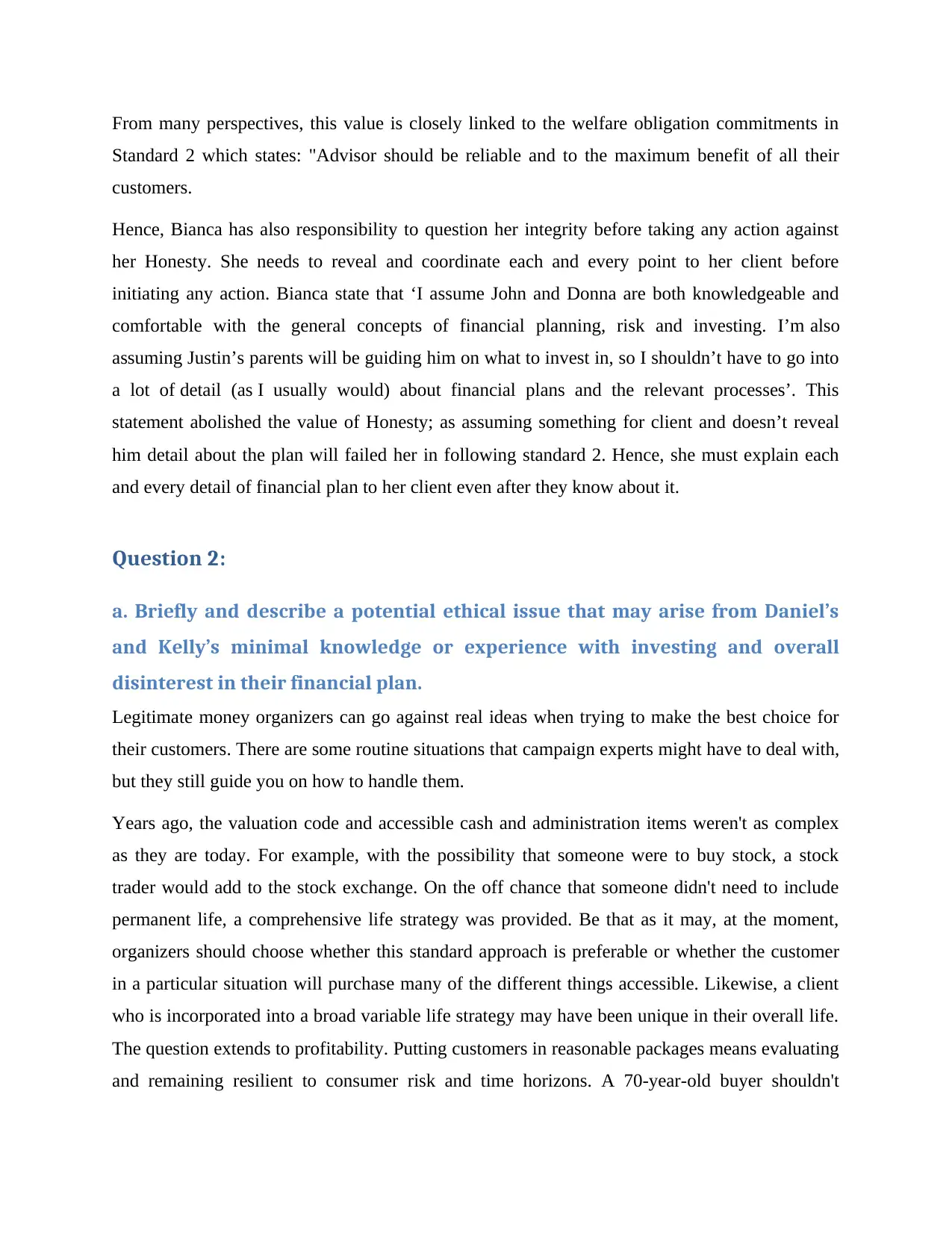
From many perspectives, this value is closely linked to the welfare obligation commitments in
Standard 2 which states: "Advisor should be reliable and to the maximum benefit of all their
customers.
Hence, Bianca has also responsibility to question her integrity before taking any action against
her Honesty. She needs to reveal and coordinate each and every point to her client before
initiating any action. Bianca state that ‘I assume John and Donna are both knowledgeable and
comfortable with the general concepts of financial planning, risk and investing. I’m also
assuming Justin’s parents will be guiding him on what to invest in, so I shouldn’t have to go into
a lot of detail (as I usually would) about financial plans and the relevant processes’. This
statement abolished the value of Honesty; as assuming something for client and doesn’t reveal
him detail about the plan will failed her in following standard 2. Hence, she must explain each
and every detail of financial plan to her client even after they know about it.
Question 2:
a. Briefly and describe a potential ethical issue that may arise from Daniel’s
and Kelly’s minimal knowledge or experience with investing and overall
disinterest in their financial plan.
Legitimate money organizers can go against real ideas when trying to make the best choice for
their customers. There are some routine situations that campaign experts might have to deal with,
but they still guide you on how to handle them.
Years ago, the valuation code and accessible cash and administration items weren't as complex
as they are today. For example, with the possibility that someone were to buy stock, a stock
trader would add to the stock exchange. On the off chance that someone didn't need to include
permanent life, a comprehensive life strategy was provided. Be that as it may, at the moment,
organizers should choose whether this standard approach is preferable or whether the customer
in a particular situation will purchase many of the different things accessible. Likewise, a client
who is incorporated into a broad variable life strategy may have been unique in their overall life.
The question extends to profitability. Putting customers in reasonable packages means evaluating
and remaining resilient to consumer risk and time horizons. A 70-year-old buyer shouldn't
Standard 2 which states: "Advisor should be reliable and to the maximum benefit of all their
customers.
Hence, Bianca has also responsibility to question her integrity before taking any action against
her Honesty. She needs to reveal and coordinate each and every point to her client before
initiating any action. Bianca state that ‘I assume John and Donna are both knowledgeable and
comfortable with the general concepts of financial planning, risk and investing. I’m also
assuming Justin’s parents will be guiding him on what to invest in, so I shouldn’t have to go into
a lot of detail (as I usually would) about financial plans and the relevant processes’. This
statement abolished the value of Honesty; as assuming something for client and doesn’t reveal
him detail about the plan will failed her in following standard 2. Hence, she must explain each
and every detail of financial plan to her client even after they know about it.
Question 2:
a. Briefly and describe a potential ethical issue that may arise from Daniel’s
and Kelly’s minimal knowledge or experience with investing and overall
disinterest in their financial plan.
Legitimate money organizers can go against real ideas when trying to make the best choice for
their customers. There are some routine situations that campaign experts might have to deal with,
but they still guide you on how to handle them.
Years ago, the valuation code and accessible cash and administration items weren't as complex
as they are today. For example, with the possibility that someone were to buy stock, a stock
trader would add to the stock exchange. On the off chance that someone didn't need to include
permanent life, a comprehensive life strategy was provided. Be that as it may, at the moment,
organizers should choose whether this standard approach is preferable or whether the customer
in a particular situation will purchase many of the different things accessible. Likewise, a client
who is incorporated into a broad variable life strategy may have been unique in their overall life.
The question extends to profitability. Putting customers in reasonable packages means evaluating
and remaining resilient to consumer risk and time horizons. A 70-year-old buyer shouldn't
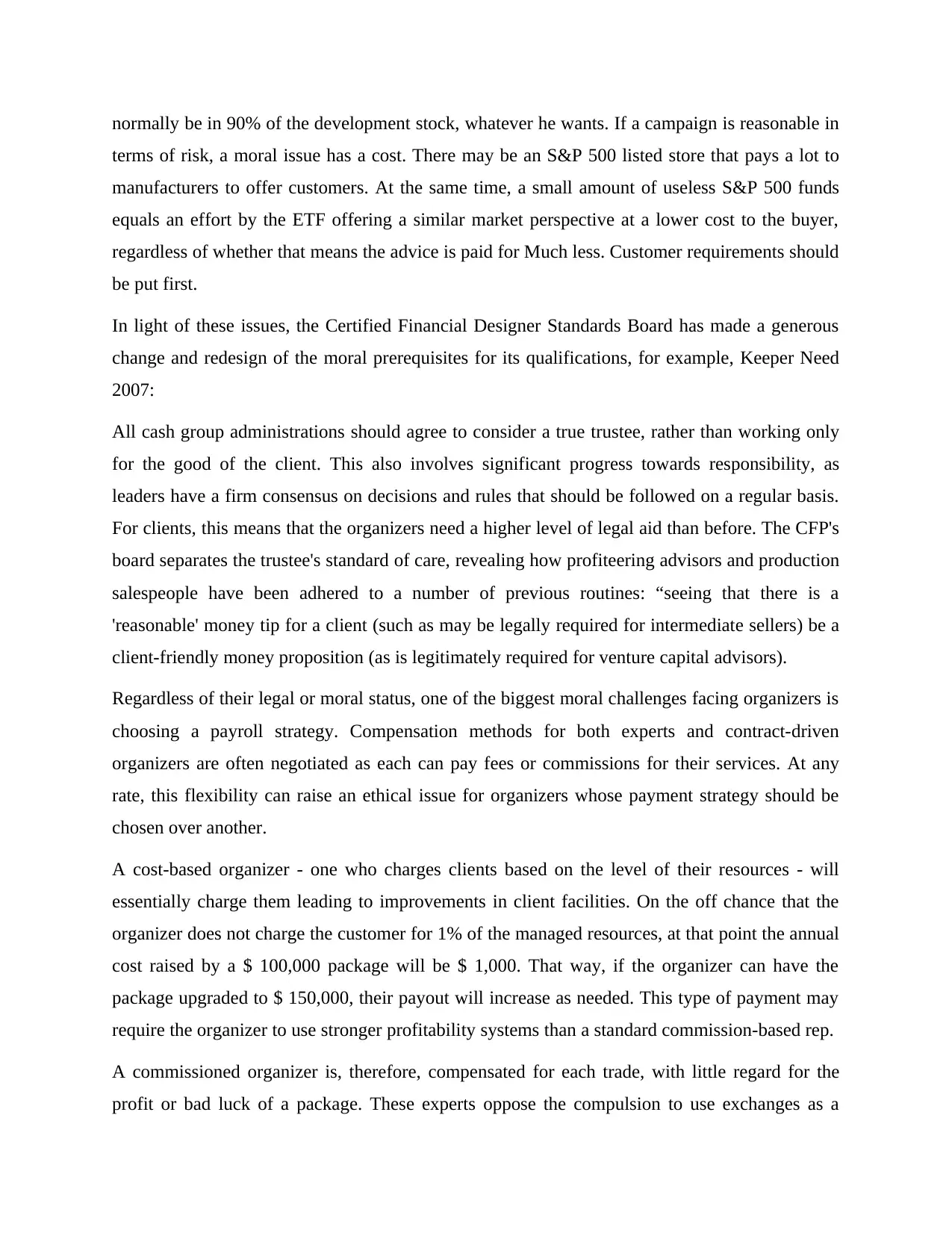
normally be in 90% of the development stock, whatever he wants. If a campaign is reasonable in
terms of risk, a moral issue has a cost. There may be an S&P 500 listed store that pays a lot to
manufacturers to offer customers. At the same time, a small amount of useless S&P 500 funds
equals an effort by the ETF offering a similar market perspective at a lower cost to the buyer,
regardless of whether that means the advice is paid for Much less. Customer requirements should
be put first.
In light of these issues, the Certified Financial Designer Standards Board has made a generous
change and redesign of the moral prerequisites for its qualifications, for example, Keeper Need
2007:
All cash group administrations should agree to consider a true trustee, rather than working only
for the good of the client. This also involves significant progress towards responsibility, as
leaders have a firm consensus on decisions and rules that should be followed on a regular basis.
For clients, this means that the organizers need a higher level of legal aid than before. The CFP's
board separates the trustee's standard of care, revealing how profiteering advisors and production
salespeople have been adhered to a number of previous routines: “seeing that there is a
'reasonable' money tip for a client (such as may be legally required for intermediate sellers) be a
client-friendly money proposition (as is legitimately required for venture capital advisors).
Regardless of their legal or moral status, one of the biggest moral challenges facing organizers is
choosing a payroll strategy. Compensation methods for both experts and contract-driven
organizers are often negotiated as each can pay fees or commissions for their services. At any
rate, this flexibility can raise an ethical issue for organizers whose payment strategy should be
chosen over another.
A cost-based organizer - one who charges clients based on the level of their resources - will
essentially charge them leading to improvements in client facilities. On the off chance that the
organizer does not charge the customer for 1% of the managed resources, at that point the annual
cost raised by a $ 100,000 package will be $ 1,000. That way, if the organizer can have the
package upgraded to $ 150,000, their payout will increase as needed. This type of payment may
require the organizer to use stronger profitability systems than a standard commission-based rep.
A commissioned organizer is, therefore, compensated for each trade, with little regard for the
profit or bad luck of a package. These experts oppose the compulsion to use exchanges as a
terms of risk, a moral issue has a cost. There may be an S&P 500 listed store that pays a lot to
manufacturers to offer customers. At the same time, a small amount of useless S&P 500 funds
equals an effort by the ETF offering a similar market perspective at a lower cost to the buyer,
regardless of whether that means the advice is paid for Much less. Customer requirements should
be put first.
In light of these issues, the Certified Financial Designer Standards Board has made a generous
change and redesign of the moral prerequisites for its qualifications, for example, Keeper Need
2007:
All cash group administrations should agree to consider a true trustee, rather than working only
for the good of the client. This also involves significant progress towards responsibility, as
leaders have a firm consensus on decisions and rules that should be followed on a regular basis.
For clients, this means that the organizers need a higher level of legal aid than before. The CFP's
board separates the trustee's standard of care, revealing how profiteering advisors and production
salespeople have been adhered to a number of previous routines: “seeing that there is a
'reasonable' money tip for a client (such as may be legally required for intermediate sellers) be a
client-friendly money proposition (as is legitimately required for venture capital advisors).
Regardless of their legal or moral status, one of the biggest moral challenges facing organizers is
choosing a payroll strategy. Compensation methods for both experts and contract-driven
organizers are often negotiated as each can pay fees or commissions for their services. At any
rate, this flexibility can raise an ethical issue for organizers whose payment strategy should be
chosen over another.
A cost-based organizer - one who charges clients based on the level of their resources - will
essentially charge them leading to improvements in client facilities. On the off chance that the
organizer does not charge the customer for 1% of the managed resources, at that point the annual
cost raised by a $ 100,000 package will be $ 1,000. That way, if the organizer can have the
package upgraded to $ 150,000, their payout will increase as needed. This type of payment may
require the organizer to use stronger profitability systems than a standard commission-based rep.
A commissioned organizer is, therefore, compensated for each trade, with little regard for the
profit or bad luck of a package. These experts oppose the compulsion to use exchanges as a
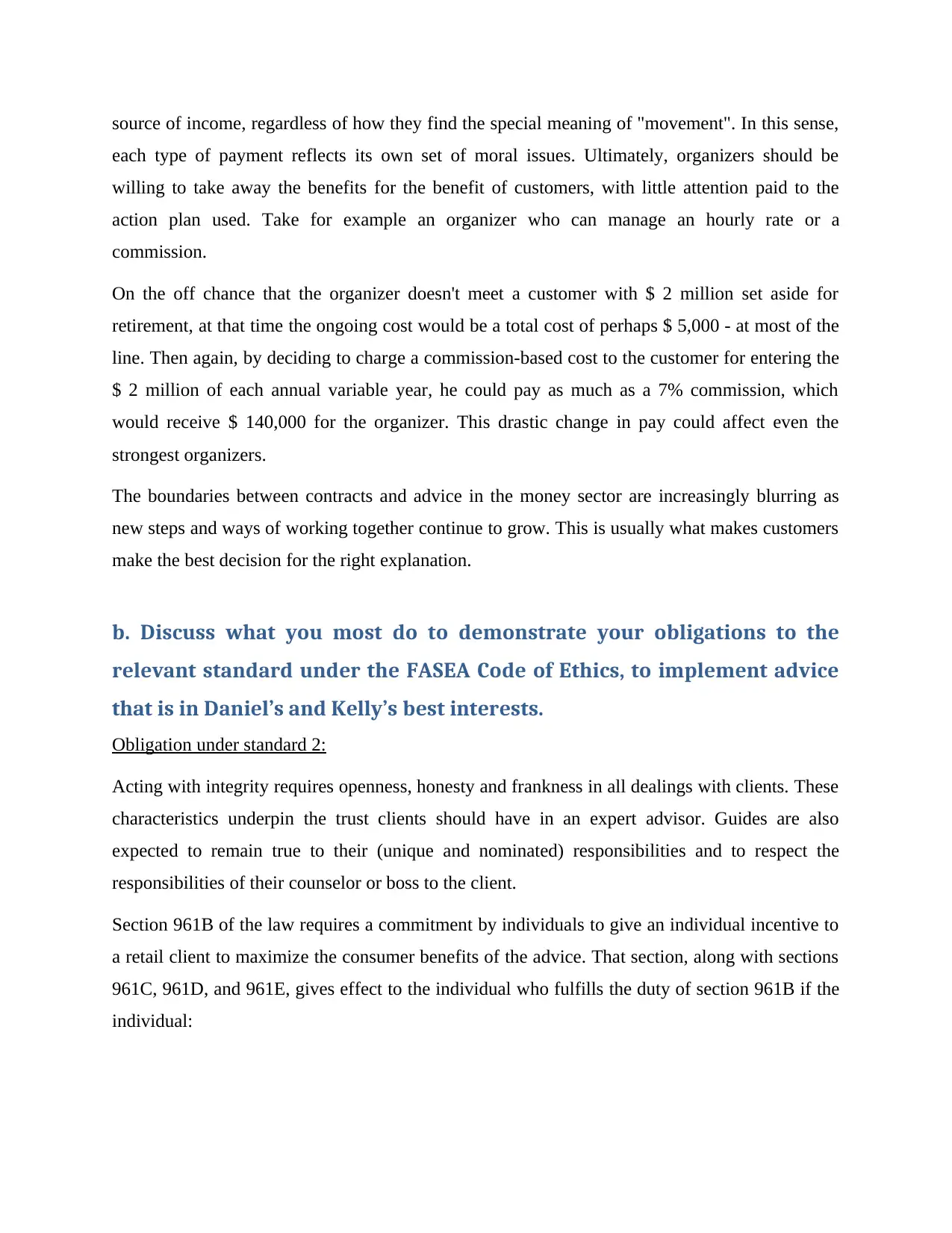
source of income, regardless of how they find the special meaning of "movement". In this sense,
each type of payment reflects its own set of moral issues. Ultimately, organizers should be
willing to take away the benefits for the benefit of customers, with little attention paid to the
action plan used. Take for example an organizer who can manage an hourly rate or a
commission.
On the off chance that the organizer doesn't meet a customer with $ 2 million set aside for
retirement, at that time the ongoing cost would be a total cost of perhaps $ 5,000 - at most of the
line. Then again, by deciding to charge a commission-based cost to the customer for entering the
$ 2 million of each annual variable year, he could pay as much as a 7% commission, which
would receive $ 140,000 for the organizer. This drastic change in pay could affect even the
strongest organizers.
The boundaries between contracts and advice in the money sector are increasingly blurring as
new steps and ways of working together continue to grow. This is usually what makes customers
make the best decision for the right explanation.
b. Discuss what you most do to demonstrate your obligations to the
relevant standard under the FASEA Code of Ethics, to implement advice
that is in Daniel’s and Kelly’s best interests.
Obligation under standard 2:
Acting with integrity requires openness, honesty and frankness in all dealings with clients. These
characteristics underpin the trust clients should have in an expert advisor. Guides are also
expected to remain true to their (unique and nominated) responsibilities and to respect the
responsibilities of their counselor or boss to the client.
Section 961B of the law requires a commitment by individuals to give an individual incentive to
a retail client to maximize the consumer benefits of the advice. That section, along with sections
961C, 961D, and 961E, gives effect to the individual who fulfills the duty of section 961B if the
individual:
each type of payment reflects its own set of moral issues. Ultimately, organizers should be
willing to take away the benefits for the benefit of customers, with little attention paid to the
action plan used. Take for example an organizer who can manage an hourly rate or a
commission.
On the off chance that the organizer doesn't meet a customer with $ 2 million set aside for
retirement, at that time the ongoing cost would be a total cost of perhaps $ 5,000 - at most of the
line. Then again, by deciding to charge a commission-based cost to the customer for entering the
$ 2 million of each annual variable year, he could pay as much as a 7% commission, which
would receive $ 140,000 for the organizer. This drastic change in pay could affect even the
strongest organizers.
The boundaries between contracts and advice in the money sector are increasingly blurring as
new steps and ways of working together continue to grow. This is usually what makes customers
make the best decision for the right explanation.
b. Discuss what you most do to demonstrate your obligations to the
relevant standard under the FASEA Code of Ethics, to implement advice
that is in Daniel’s and Kelly’s best interests.
Obligation under standard 2:
Acting with integrity requires openness, honesty and frankness in all dealings with clients. These
characteristics underpin the trust clients should have in an expert advisor. Guides are also
expected to remain true to their (unique and nominated) responsibilities and to respect the
responsibilities of their counselor or boss to the client.
Section 961B of the law requires a commitment by individuals to give an individual incentive to
a retail client to maximize the consumer benefits of the advice. That section, along with sections
961C, 961D, and 961E, gives effect to the individual who fulfills the duty of section 961B if the
individual:
Paraphrase This Document
Need a fresh take? Get an instant paraphrase of this document with our AI Paraphraser
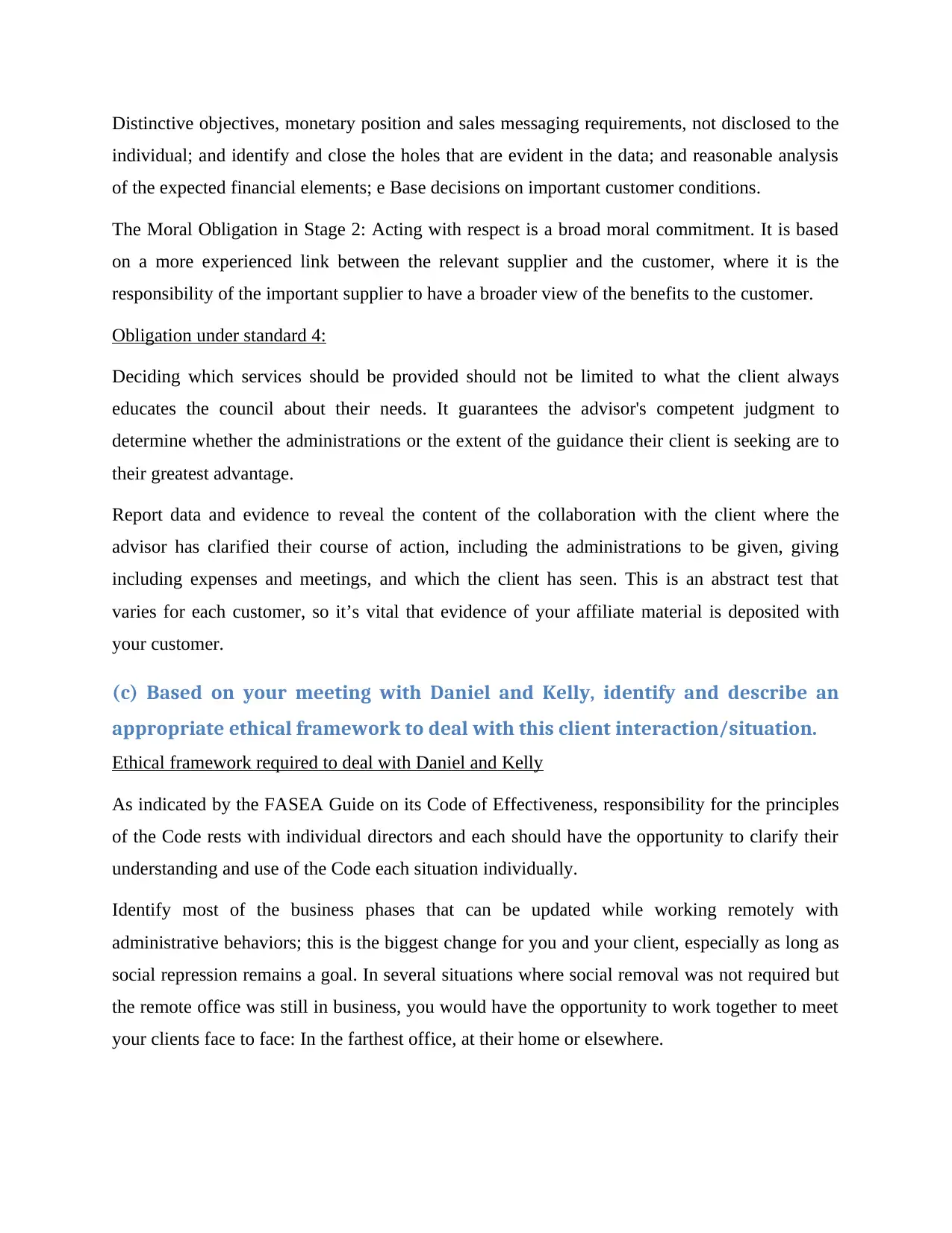
Distinctive objectives, monetary position and sales messaging requirements, not disclosed to the
individual; and identify and close the holes that are evident in the data; and reasonable analysis
of the expected financial elements; e Base decisions on important customer conditions.
The Moral Obligation in Stage 2: Acting with respect is a broad moral commitment. It is based
on a more experienced link between the relevant supplier and the customer, where it is the
responsibility of the important supplier to have a broader view of the benefits to the customer.
Obligation under standard 4:
Deciding which services should be provided should not be limited to what the client always
educates the council about their needs. It guarantees the advisor's competent judgment to
determine whether the administrations or the extent of the guidance their client is seeking are to
their greatest advantage.
Report data and evidence to reveal the content of the collaboration with the client where the
advisor has clarified their course of action, including the administrations to be given, giving
including expenses and meetings, and which the client has seen. This is an abstract test that
varies for each customer, so it’s vital that evidence of your affiliate material is deposited with
your customer.
(c) Based on your meeting with Daniel and Kelly, identify and describe an
appropriate ethical framework to deal with this client interaction/situation.
Ethical framework required to deal with Daniel and Kelly
As indicated by the FASEA Guide on its Code of Effectiveness, responsibility for the principles
of the Code rests with individual directors and each should have the opportunity to clarify their
understanding and use of the Code each situation individually.
Identify most of the business phases that can be updated while working remotely with
administrative behaviors; this is the biggest change for you and your client, especially as long as
social repression remains a goal. In several situations where social removal was not required but
the remote office was still in business, you would have the opportunity to work together to meet
your clients face to face: In the farthest office, at their home or elsewhere.
individual; and identify and close the holes that are evident in the data; and reasonable analysis
of the expected financial elements; e Base decisions on important customer conditions.
The Moral Obligation in Stage 2: Acting with respect is a broad moral commitment. It is based
on a more experienced link between the relevant supplier and the customer, where it is the
responsibility of the important supplier to have a broader view of the benefits to the customer.
Obligation under standard 4:
Deciding which services should be provided should not be limited to what the client always
educates the council about their needs. It guarantees the advisor's competent judgment to
determine whether the administrations or the extent of the guidance their client is seeking are to
their greatest advantage.
Report data and evidence to reveal the content of the collaboration with the client where the
advisor has clarified their course of action, including the administrations to be given, giving
including expenses and meetings, and which the client has seen. This is an abstract test that
varies for each customer, so it’s vital that evidence of your affiliate material is deposited with
your customer.
(c) Based on your meeting with Daniel and Kelly, identify and describe an
appropriate ethical framework to deal with this client interaction/situation.
Ethical framework required to deal with Daniel and Kelly
As indicated by the FASEA Guide on its Code of Effectiveness, responsibility for the principles
of the Code rests with individual directors and each should have the opportunity to clarify their
understanding and use of the Code each situation individually.
Identify most of the business phases that can be updated while working remotely with
administrative behaviors; this is the biggest change for you and your client, especially as long as
social repression remains a goal. In several situations where social removal was not required but
the remote office was still in business, you would have the opportunity to work together to meet
your clients face to face: In the farthest office, at their home or elsewhere.
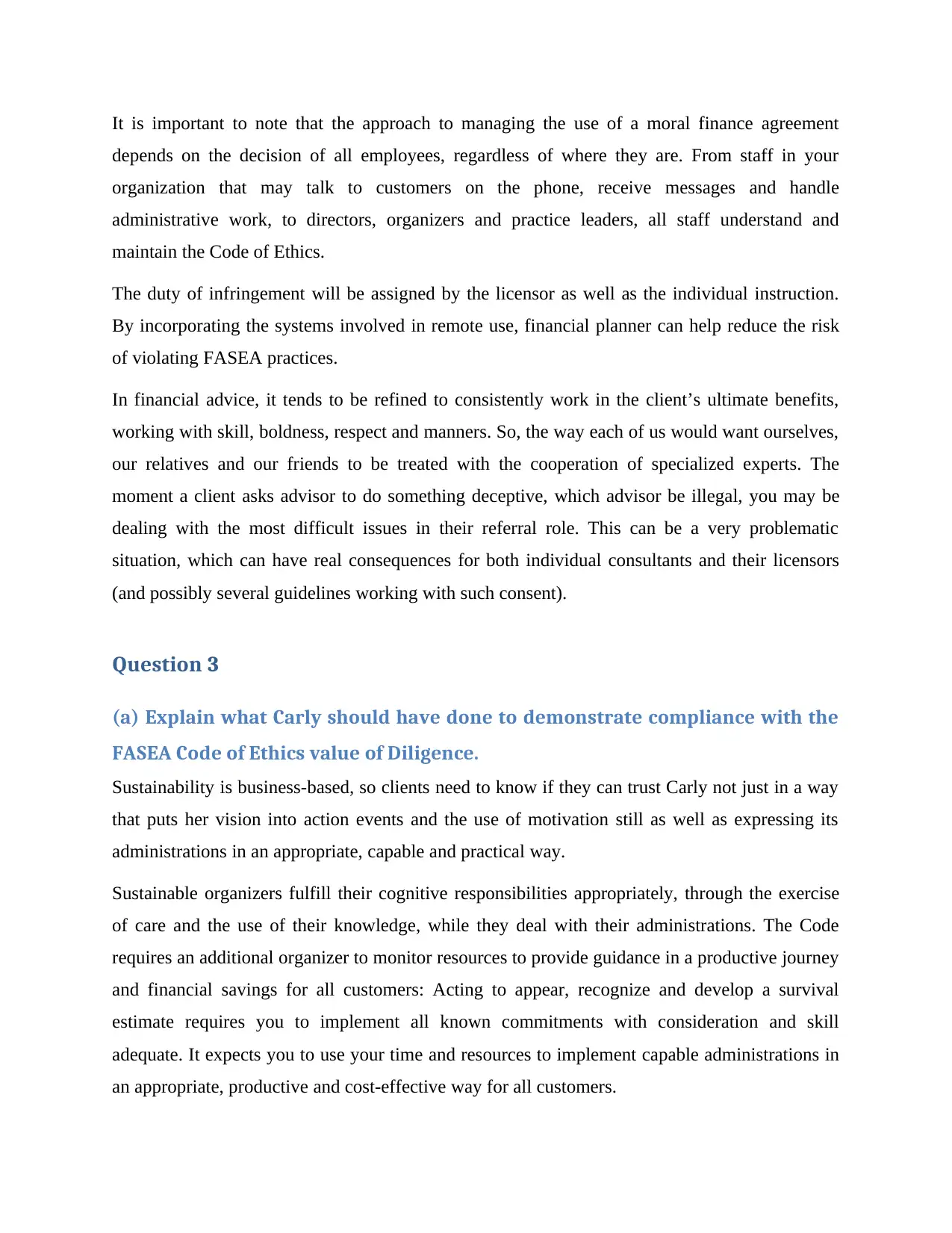
It is important to note that the approach to managing the use of a moral finance agreement
depends on the decision of all employees, regardless of where they are. From staff in your
organization that may talk to customers on the phone, receive messages and handle
administrative work, to directors, organizers and practice leaders, all staff understand and
maintain the Code of Ethics.
The duty of infringement will be assigned by the licensor as well as the individual instruction.
By incorporating the systems involved in remote use, financial planner can help reduce the risk
of violating FASEA practices.
In financial advice, it tends to be refined to consistently work in the client’s ultimate benefits,
working with skill, boldness, respect and manners. So, the way each of us would want ourselves,
our relatives and our friends to be treated with the cooperation of specialized experts. The
moment a client asks advisor to do something deceptive, which advisor be illegal, you may be
dealing with the most difficult issues in their referral role. This can be a very problematic
situation, which can have real consequences for both individual consultants and their licensors
(and possibly several guidelines working with such consent).
Question 3
(a) Explain what Carly should have done to demonstrate compliance with the
FASEA Code of Ethics value of Diligence.
Sustainability is business-based, so clients need to know if they can trust Carly not just in a way
that puts her vision into action events and the use of motivation still as well as expressing its
administrations in an appropriate, capable and practical way.
Sustainable organizers fulfill their cognitive responsibilities appropriately, through the exercise
of care and the use of their knowledge, while they deal with their administrations. The Code
requires an additional organizer to monitor resources to provide guidance in a productive journey
and financial savings for all customers: Acting to appear, recognize and develop a survival
estimate requires you to implement all known commitments with consideration and skill
adequate. It expects you to use your time and resources to implement capable administrations in
an appropriate, productive and cost-effective way for all customers.
depends on the decision of all employees, regardless of where they are. From staff in your
organization that may talk to customers on the phone, receive messages and handle
administrative work, to directors, organizers and practice leaders, all staff understand and
maintain the Code of Ethics.
The duty of infringement will be assigned by the licensor as well as the individual instruction.
By incorporating the systems involved in remote use, financial planner can help reduce the risk
of violating FASEA practices.
In financial advice, it tends to be refined to consistently work in the client’s ultimate benefits,
working with skill, boldness, respect and manners. So, the way each of us would want ourselves,
our relatives and our friends to be treated with the cooperation of specialized experts. The
moment a client asks advisor to do something deceptive, which advisor be illegal, you may be
dealing with the most difficult issues in their referral role. This can be a very problematic
situation, which can have real consequences for both individual consultants and their licensors
(and possibly several guidelines working with such consent).
Question 3
(a) Explain what Carly should have done to demonstrate compliance with the
FASEA Code of Ethics value of Diligence.
Sustainability is business-based, so clients need to know if they can trust Carly not just in a way
that puts her vision into action events and the use of motivation still as well as expressing its
administrations in an appropriate, capable and practical way.
Sustainable organizers fulfill their cognitive responsibilities appropriately, through the exercise
of care and the use of their knowledge, while they deal with their administrations. The Code
requires an additional organizer to monitor resources to provide guidance in a productive journey
and financial savings for all customers: Acting to appear, recognize and develop a survival
estimate requires you to implement all known commitments with consideration and skill
adequate. It expects you to use your time and resources to implement capable administrations in
an appropriate, productive and cost-effective way for all customers.
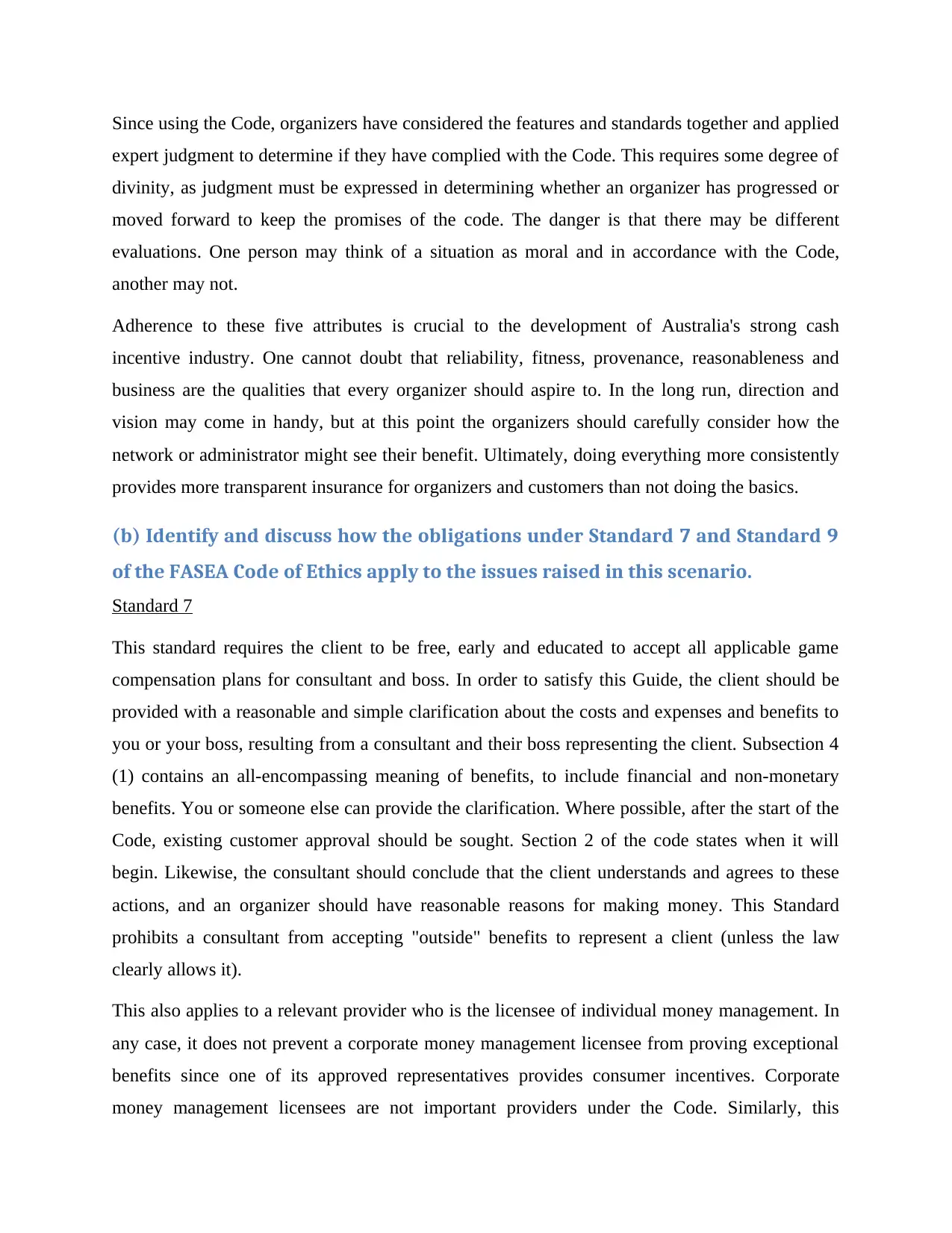
Since using the Code, organizers have considered the features and standards together and applied
expert judgment to determine if they have complied with the Code. This requires some degree of
divinity, as judgment must be expressed in determining whether an organizer has progressed or
moved forward to keep the promises of the code. The danger is that there may be different
evaluations. One person may think of a situation as moral and in accordance with the Code,
another may not.
Adherence to these five attributes is crucial to the development of Australia's strong cash
incentive industry. One cannot doubt that reliability, fitness, provenance, reasonableness and
business are the qualities that every organizer should aspire to. In the long run, direction and
vision may come in handy, but at this point the organizers should carefully consider how the
network or administrator might see their benefit. Ultimately, doing everything more consistently
provides more transparent insurance for organizers and customers than not doing the basics.
(b) Identify and discuss how the obligations under Standard 7 and Standard 9
of the FASEA Code of Ethics apply to the issues raised in this scenario.
Standard 7
This standard requires the client to be free, early and educated to accept all applicable game
compensation plans for consultant and boss. In order to satisfy this Guide, the client should be
provided with a reasonable and simple clarification about the costs and expenses and benefits to
you or your boss, resulting from a consultant and their boss representing the client. Subsection 4
(1) contains an all-encompassing meaning of benefits, to include financial and non-monetary
benefits. You or someone else can provide the clarification. Where possible, after the start of the
Code, existing customer approval should be sought. Section 2 of the code states when it will
begin. Likewise, the consultant should conclude that the client understands and agrees to these
actions, and an organizer should have reasonable reasons for making money. This Standard
prohibits a consultant from accepting "outside" benefits to represent a client (unless the law
clearly allows it).
This also applies to a relevant provider who is the licensee of individual money management. In
any case, it does not prevent a corporate money management licensee from proving exceptional
benefits since one of its approved representatives provides consumer incentives. Corporate
money management licensees are not important providers under the Code. Similarly, this
expert judgment to determine if they have complied with the Code. This requires some degree of
divinity, as judgment must be expressed in determining whether an organizer has progressed or
moved forward to keep the promises of the code. The danger is that there may be different
evaluations. One person may think of a situation as moral and in accordance with the Code,
another may not.
Adherence to these five attributes is crucial to the development of Australia's strong cash
incentive industry. One cannot doubt that reliability, fitness, provenance, reasonableness and
business are the qualities that every organizer should aspire to. In the long run, direction and
vision may come in handy, but at this point the organizers should carefully consider how the
network or administrator might see their benefit. Ultimately, doing everything more consistently
provides more transparent insurance for organizers and customers than not doing the basics.
(b) Identify and discuss how the obligations under Standard 7 and Standard 9
of the FASEA Code of Ethics apply to the issues raised in this scenario.
Standard 7
This standard requires the client to be free, early and educated to accept all applicable game
compensation plans for consultant and boss. In order to satisfy this Guide, the client should be
provided with a reasonable and simple clarification about the costs and expenses and benefits to
you or your boss, resulting from a consultant and their boss representing the client. Subsection 4
(1) contains an all-encompassing meaning of benefits, to include financial and non-monetary
benefits. You or someone else can provide the clarification. Where possible, after the start of the
Code, existing customer approval should be sought. Section 2 of the code states when it will
begin. Likewise, the consultant should conclude that the client understands and agrees to these
actions, and an organizer should have reasonable reasons for making money. This Standard
prohibits a consultant from accepting "outside" benefits to represent a client (unless the law
clearly allows it).
This also applies to a relevant provider who is the licensee of individual money management. In
any case, it does not prevent a corporate money management licensee from proving exceptional
benefits since one of its approved representatives provides consumer incentives. Corporate
money management licensees are not important providers under the Code. Similarly, this
Secure Best Marks with AI Grader
Need help grading? Try our AI Grader for instant feedback on your assignments.
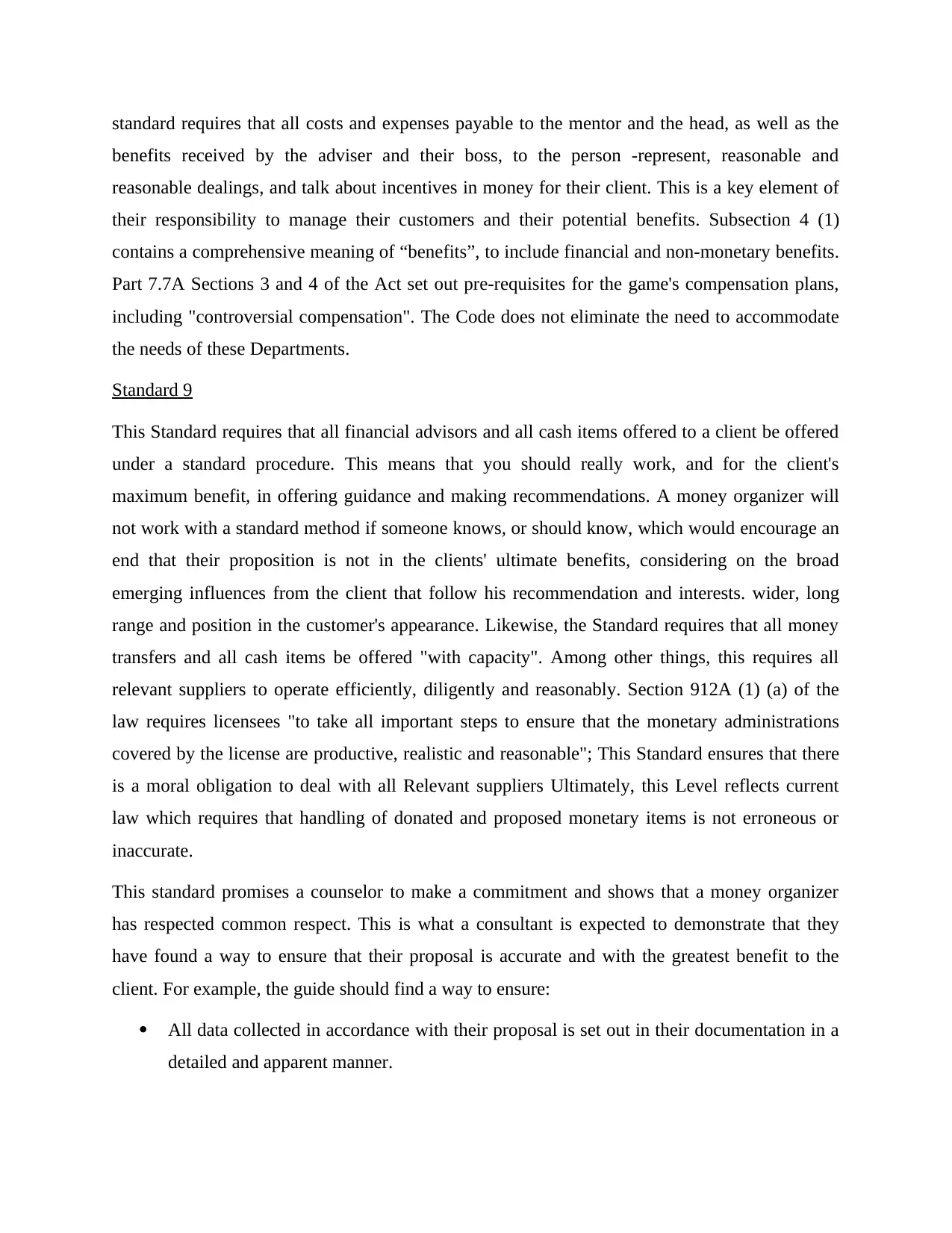
standard requires that all costs and expenses payable to the mentor and the head, as well as the
benefits received by the adviser and their boss, to the person -represent, reasonable and
reasonable dealings, and talk about incentives in money for their client. This is a key element of
their responsibility to manage their customers and their potential benefits. Subsection 4 (1)
contains a comprehensive meaning of “benefits”, to include financial and non-monetary benefits.
Part 7.7A Sections 3 and 4 of the Act set out pre-requisites for the game's compensation plans,
including "controversial compensation". The Code does not eliminate the need to accommodate
the needs of these Departments.
Standard 9
This Standard requires that all financial advisors and all cash items offered to a client be offered
under a standard procedure. This means that you should really work, and for the client's
maximum benefit, in offering guidance and making recommendations. A money organizer will
not work with a standard method if someone knows, or should know, which would encourage an
end that their proposition is not in the clients' ultimate benefits, considering on the broad
emerging influences from the client that follow his recommendation and interests. wider, long
range and position in the customer's appearance. Likewise, the Standard requires that all money
transfers and all cash items be offered "with capacity". Among other things, this requires all
relevant suppliers to operate efficiently, diligently and reasonably. Section 912A (1) (a) of the
law requires licensees "to take all important steps to ensure that the monetary administrations
covered by the license are productive, realistic and reasonable"; This Standard ensures that there
is a moral obligation to deal with all Relevant suppliers Ultimately, this Level reflects current
law which requires that handling of donated and proposed monetary items is not erroneous or
inaccurate.
This standard promises a counselor to make a commitment and shows that a money organizer
has respected common respect. This is what a consultant is expected to demonstrate that they
have found a way to ensure that their proposal is accurate and with the greatest benefit to the
client. For example, the guide should find a way to ensure:
All data collected in accordance with their proposal is set out in their documentation in a
detailed and apparent manner.
benefits received by the adviser and their boss, to the person -represent, reasonable and
reasonable dealings, and talk about incentives in money for their client. This is a key element of
their responsibility to manage their customers and their potential benefits. Subsection 4 (1)
contains a comprehensive meaning of “benefits”, to include financial and non-monetary benefits.
Part 7.7A Sections 3 and 4 of the Act set out pre-requisites for the game's compensation plans,
including "controversial compensation". The Code does not eliminate the need to accommodate
the needs of these Departments.
Standard 9
This Standard requires that all financial advisors and all cash items offered to a client be offered
under a standard procedure. This means that you should really work, and for the client's
maximum benefit, in offering guidance and making recommendations. A money organizer will
not work with a standard method if someone knows, or should know, which would encourage an
end that their proposition is not in the clients' ultimate benefits, considering on the broad
emerging influences from the client that follow his recommendation and interests. wider, long
range and position in the customer's appearance. Likewise, the Standard requires that all money
transfers and all cash items be offered "with capacity". Among other things, this requires all
relevant suppliers to operate efficiently, diligently and reasonably. Section 912A (1) (a) of the
law requires licensees "to take all important steps to ensure that the monetary administrations
covered by the license are productive, realistic and reasonable"; This Standard ensures that there
is a moral obligation to deal with all Relevant suppliers Ultimately, this Level reflects current
law which requires that handling of donated and proposed monetary items is not erroneous or
inaccurate.
This standard promises a counselor to make a commitment and shows that a money organizer
has respected common respect. This is what a consultant is expected to demonstrate that they
have found a way to ensure that their proposal is accurate and with the greatest benefit to the
client. For example, the guide should find a way to ensure:
All data collected in accordance with their proposal is set out in their documentation in a
detailed and apparent manner.
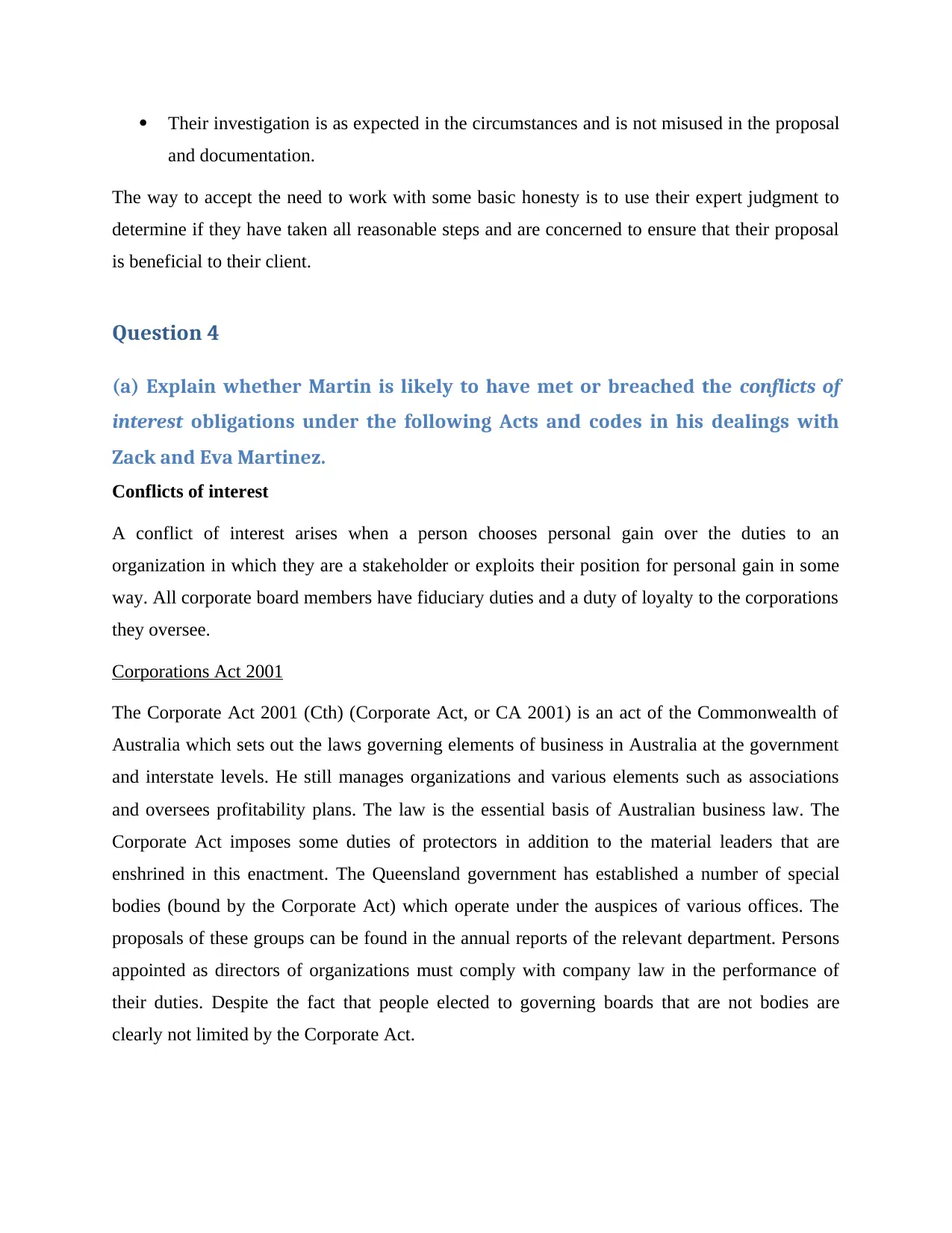
Their investigation is as expected in the circumstances and is not misused in the proposal
and documentation.
The way to accept the need to work with some basic honesty is to use their expert judgment to
determine if they have taken all reasonable steps and are concerned to ensure that their proposal
is beneficial to their client.
Question 4
(a) Explain whether Martin is likely to have met or breached the conflicts of
interest obligations under the following Acts and codes in his dealings with
Zack and Eva Martinez.
Conflicts of interest
A conflict of interest arises when a person chooses personal gain over the duties to an
organization in which they are a stakeholder or exploits their position for personal gain in some
way. All corporate board members have fiduciary duties and a duty of loyalty to the corporations
they oversee.
Corporations Act 2001
The Corporate Act 2001 (Cth) (Corporate Act, or CA 2001) is an act of the Commonwealth of
Australia which sets out the laws governing elements of business in Australia at the government
and interstate levels. He still manages organizations and various elements such as associations
and oversees profitability plans. The law is the essential basis of Australian business law. The
Corporate Act imposes some duties of protectors in addition to the material leaders that are
enshrined in this enactment. The Queensland government has established a number of special
bodies (bound by the Corporate Act) which operate under the auspices of various offices. The
proposals of these groups can be found in the annual reports of the relevant department. Persons
appointed as directors of organizations must comply with company law in the performance of
their duties. Despite the fact that people elected to governing boards that are not bodies are
clearly not limited by the Corporate Act.
and documentation.
The way to accept the need to work with some basic honesty is to use their expert judgment to
determine if they have taken all reasonable steps and are concerned to ensure that their proposal
is beneficial to their client.
Question 4
(a) Explain whether Martin is likely to have met or breached the conflicts of
interest obligations under the following Acts and codes in his dealings with
Zack and Eva Martinez.
Conflicts of interest
A conflict of interest arises when a person chooses personal gain over the duties to an
organization in which they are a stakeholder or exploits their position for personal gain in some
way. All corporate board members have fiduciary duties and a duty of loyalty to the corporations
they oversee.
Corporations Act 2001
The Corporate Act 2001 (Cth) (Corporate Act, or CA 2001) is an act of the Commonwealth of
Australia which sets out the laws governing elements of business in Australia at the government
and interstate levels. He still manages organizations and various elements such as associations
and oversees profitability plans. The law is the essential basis of Australian business law. The
Corporate Act imposes some duties of protectors in addition to the material leaders that are
enshrined in this enactment. The Queensland government has established a number of special
bodies (bound by the Corporate Act) which operate under the auspices of various offices. The
proposals of these groups can be found in the annual reports of the relevant department. Persons
appointed as directors of organizations must comply with company law in the performance of
their duties. Despite the fact that people elected to governing boards that are not bodies are
clearly not limited by the Corporate Act.
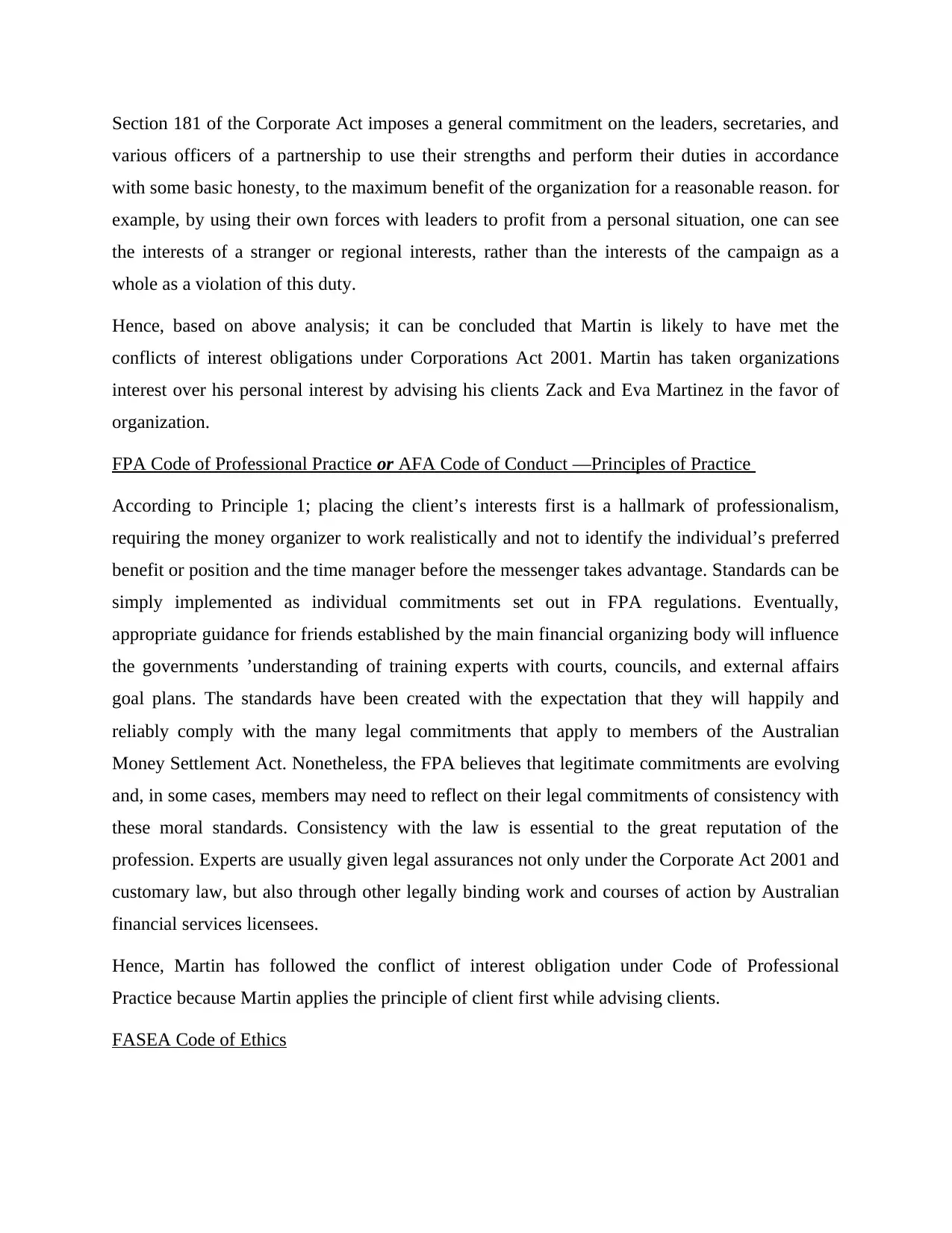
Section 181 of the Corporate Act imposes a general commitment on the leaders, secretaries, and
various officers of a partnership to use their strengths and perform their duties in accordance
with some basic honesty, to the maximum benefit of the organization for a reasonable reason. for
example, by using their own forces with leaders to profit from a personal situation, one can see
the interests of a stranger or regional interests, rather than the interests of the campaign as a
whole as a violation of this duty.
Hence, based on above analysis; it can be concluded that Martin is likely to have met the
conflicts of interest obligations under Corporations Act 2001. Martin has taken organizations
interest over his personal interest by advising his clients Zack and Eva Martinez in the favor of
organization.
FPA Code of Professional Practice or AFA Code of Conduct —Principles of Practice
According to Principle 1; placing the client’s interests first is a hallmark of professionalism,
requiring the money organizer to work realistically and not to identify the individual’s preferred
benefit or position and the time manager before the messenger takes advantage. Standards can be
simply implemented as individual commitments set out in FPA regulations. Eventually,
appropriate guidance for friends established by the main financial organizing body will influence
the governments ’understanding of training experts with courts, councils, and external affairs
goal plans. The standards have been created with the expectation that they will happily and
reliably comply with the many legal commitments that apply to members of the Australian
Money Settlement Act. Nonetheless, the FPA believes that legitimate commitments are evolving
and, in some cases, members may need to reflect on their legal commitments of consistency with
these moral standards. Consistency with the law is essential to the great reputation of the
profession. Experts are usually given legal assurances not only under the Corporate Act 2001 and
customary law, but also through other legally binding work and courses of action by Australian
financial services licensees.
Hence, Martin has followed the conflict of interest obligation under Code of Professional
Practice because Martin applies the principle of client first while advising clients.
FASEA Code of Ethics
various officers of a partnership to use their strengths and perform their duties in accordance
with some basic honesty, to the maximum benefit of the organization for a reasonable reason. for
example, by using their own forces with leaders to profit from a personal situation, one can see
the interests of a stranger or regional interests, rather than the interests of the campaign as a
whole as a violation of this duty.
Hence, based on above analysis; it can be concluded that Martin is likely to have met the
conflicts of interest obligations under Corporations Act 2001. Martin has taken organizations
interest over his personal interest by advising his clients Zack and Eva Martinez in the favor of
organization.
FPA Code of Professional Practice or AFA Code of Conduct —Principles of Practice
According to Principle 1; placing the client’s interests first is a hallmark of professionalism,
requiring the money organizer to work realistically and not to identify the individual’s preferred
benefit or position and the time manager before the messenger takes advantage. Standards can be
simply implemented as individual commitments set out in FPA regulations. Eventually,
appropriate guidance for friends established by the main financial organizing body will influence
the governments ’understanding of training experts with courts, councils, and external affairs
goal plans. The standards have been created with the expectation that they will happily and
reliably comply with the many legal commitments that apply to members of the Australian
Money Settlement Act. Nonetheless, the FPA believes that legitimate commitments are evolving
and, in some cases, members may need to reflect on their legal commitments of consistency with
these moral standards. Consistency with the law is essential to the great reputation of the
profession. Experts are usually given legal assurances not only under the Corporate Act 2001 and
customary law, but also through other legally binding work and courses of action by Australian
financial services licensees.
Hence, Martin has followed the conflict of interest obligation under Code of Professional
Practice because Martin applies the principle of client first while advising clients.
FASEA Code of Ethics
Paraphrase This Document
Need a fresh take? Get an instant paraphrase of this document with our AI Paraphraser
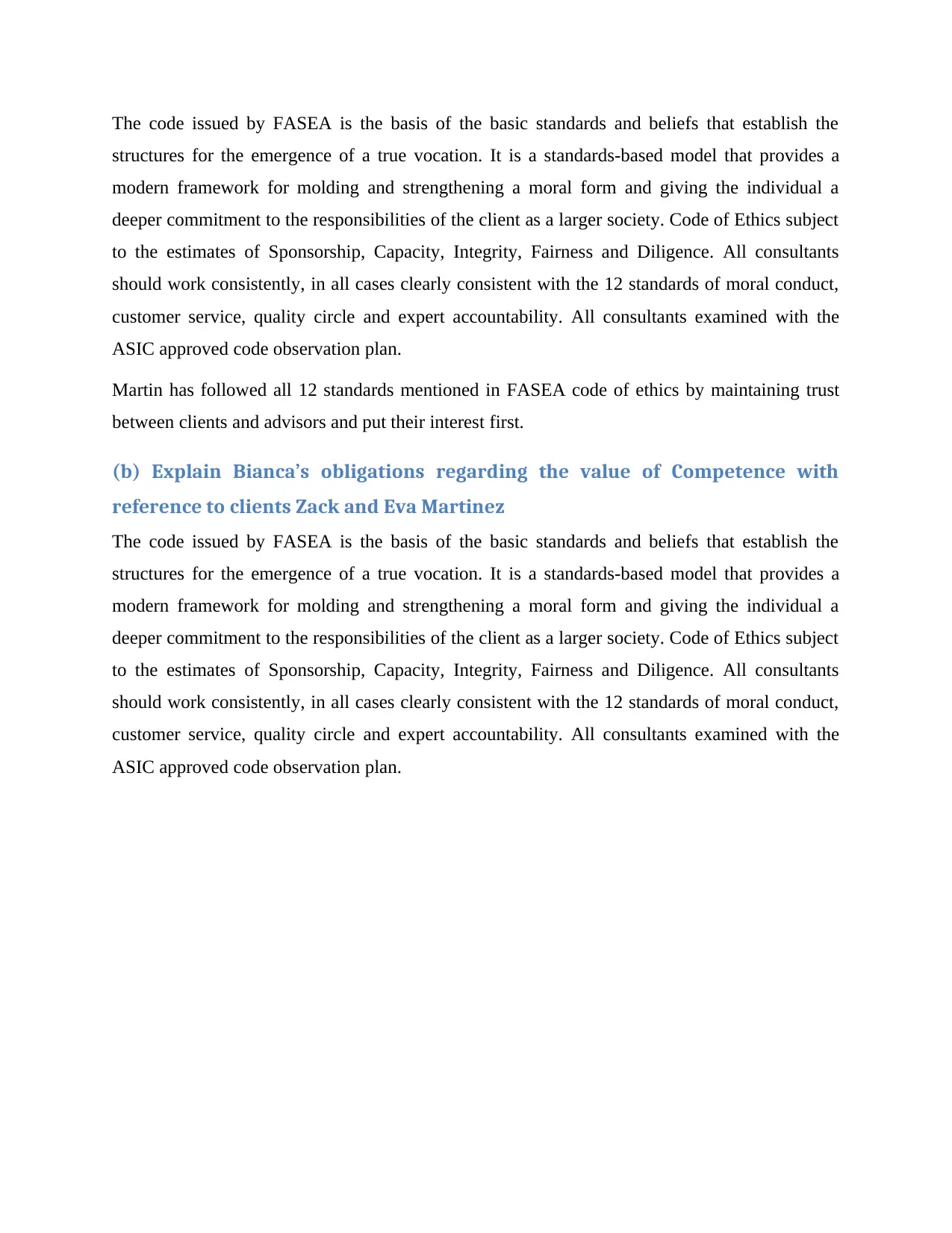
The code issued by FASEA is the basis of the basic standards and beliefs that establish the
structures for the emergence of a true vocation. It is a standards-based model that provides a
modern framework for molding and strengthening a moral form and giving the individual a
deeper commitment to the responsibilities of the client as a larger society. Code of Ethics subject
to the estimates of Sponsorship, Capacity, Integrity, Fairness and Diligence. All consultants
should work consistently, in all cases clearly consistent with the 12 standards of moral conduct,
customer service, quality circle and expert accountability. All consultants examined with the
ASIC approved code observation plan.
Martin has followed all 12 standards mentioned in FASEA code of ethics by maintaining trust
between clients and advisors and put their interest first.
(b) Explain Bianca’s obligations regarding the value of Competence with
reference to clients Zack and Eva Martinez
The code issued by FASEA is the basis of the basic standards and beliefs that establish the
structures for the emergence of a true vocation. It is a standards-based model that provides a
modern framework for molding and strengthening a moral form and giving the individual a
deeper commitment to the responsibilities of the client as a larger society. Code of Ethics subject
to the estimates of Sponsorship, Capacity, Integrity, Fairness and Diligence. All consultants
should work consistently, in all cases clearly consistent with the 12 standards of moral conduct,
customer service, quality circle and expert accountability. All consultants examined with the
ASIC approved code observation plan.
structures for the emergence of a true vocation. It is a standards-based model that provides a
modern framework for molding and strengthening a moral form and giving the individual a
deeper commitment to the responsibilities of the client as a larger society. Code of Ethics subject
to the estimates of Sponsorship, Capacity, Integrity, Fairness and Diligence. All consultants
should work consistently, in all cases clearly consistent with the 12 standards of moral conduct,
customer service, quality circle and expert accountability. All consultants examined with the
ASIC approved code observation plan.
Martin has followed all 12 standards mentioned in FASEA code of ethics by maintaining trust
between clients and advisors and put their interest first.
(b) Explain Bianca’s obligations regarding the value of Competence with
reference to clients Zack and Eva Martinez
The code issued by FASEA is the basis of the basic standards and beliefs that establish the
structures for the emergence of a true vocation. It is a standards-based model that provides a
modern framework for molding and strengthening a moral form and giving the individual a
deeper commitment to the responsibilities of the client as a larger society. Code of Ethics subject
to the estimates of Sponsorship, Capacity, Integrity, Fairness and Diligence. All consultants
should work consistently, in all cases clearly consistent with the 12 standards of moral conduct,
customer service, quality circle and expert accountability. All consultants examined with the
ASIC approved code observation plan.
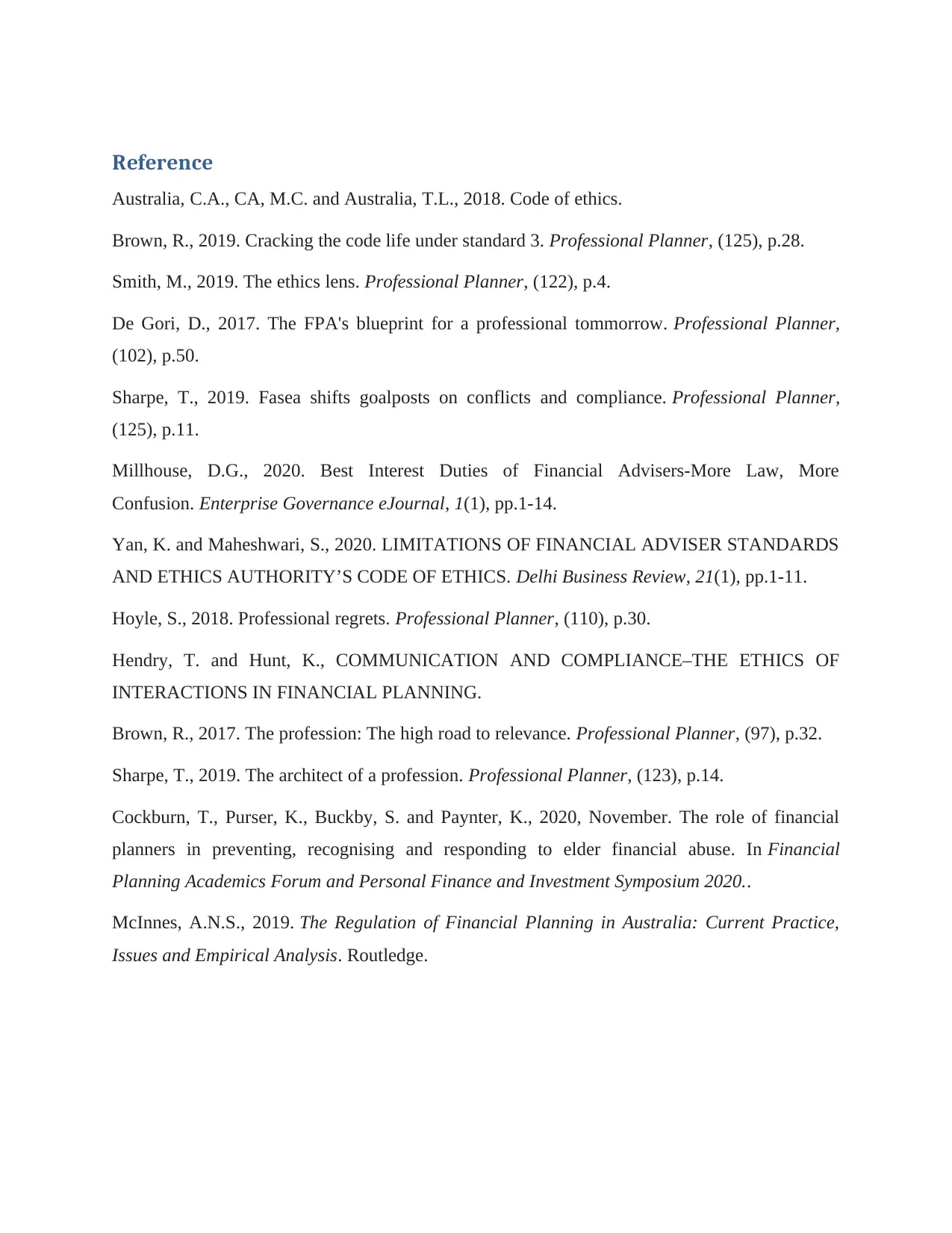
Reference
Australia, C.A., CA, M.C. and Australia, T.L., 2018. Code of ethics.
Brown, R., 2019. Cracking the code life under standard 3. Professional Planner, (125), p.28.
Smith, M., 2019. The ethics lens. Professional Planner, (122), p.4.
De Gori, D., 2017. The FPA's blueprint for a professional tommorrow. Professional Planner,
(102), p.50.
Sharpe, T., 2019. Fasea shifts goalposts on conflicts and compliance. Professional Planner,
(125), p.11.
Millhouse, D.G., 2020. Best Interest Duties of Financial Advisers-More Law, More
Confusion. Enterprise Governance eJournal, 1(1), pp.1-14.
Yan, K. and Maheshwari, S., 2020. LIMITATIONS OF FINANCIAL ADVISER STANDARDS
AND ETHICS AUTHORITY’S CODE OF ETHICS. Delhi Business Review, 21(1), pp.1-11.
Hoyle, S., 2018. Professional regrets. Professional Planner, (110), p.30.
Hendry, T. and Hunt, K., COMMUNICATION AND COMPLIANCE–THE ETHICS OF
INTERACTIONS IN FINANCIAL PLANNING.
Brown, R., 2017. The profession: The high road to relevance. Professional Planner, (97), p.32.
Sharpe, T., 2019. The architect of a profession. Professional Planner, (123), p.14.
Cockburn, T., Purser, K., Buckby, S. and Paynter, K., 2020, November. The role of financial
planners in preventing, recognising and responding to elder financial abuse. In Financial
Planning Academics Forum and Personal Finance and Investment Symposium 2020..
McInnes, A.N.S., 2019. The Regulation of Financial Planning in Australia: Current Practice,
Issues and Empirical Analysis. Routledge.
Australia, C.A., CA, M.C. and Australia, T.L., 2018. Code of ethics.
Brown, R., 2019. Cracking the code life under standard 3. Professional Planner, (125), p.28.
Smith, M., 2019. The ethics lens. Professional Planner, (122), p.4.
De Gori, D., 2017. The FPA's blueprint for a professional tommorrow. Professional Planner,
(102), p.50.
Sharpe, T., 2019. Fasea shifts goalposts on conflicts and compliance. Professional Planner,
(125), p.11.
Millhouse, D.G., 2020. Best Interest Duties of Financial Advisers-More Law, More
Confusion. Enterprise Governance eJournal, 1(1), pp.1-14.
Yan, K. and Maheshwari, S., 2020. LIMITATIONS OF FINANCIAL ADVISER STANDARDS
AND ETHICS AUTHORITY’S CODE OF ETHICS. Delhi Business Review, 21(1), pp.1-11.
Hoyle, S., 2018. Professional regrets. Professional Planner, (110), p.30.
Hendry, T. and Hunt, K., COMMUNICATION AND COMPLIANCE–THE ETHICS OF
INTERACTIONS IN FINANCIAL PLANNING.
Brown, R., 2017. The profession: The high road to relevance. Professional Planner, (97), p.32.
Sharpe, T., 2019. The architect of a profession. Professional Planner, (123), p.14.
Cockburn, T., Purser, K., Buckby, S. and Paynter, K., 2020, November. The role of financial
planners in preventing, recognising and responding to elder financial abuse. In Financial
Planning Academics Forum and Personal Finance and Investment Symposium 2020..
McInnes, A.N.S., 2019. The Regulation of Financial Planning in Australia: Current Practice,
Issues and Empirical Analysis. Routledge.
1 out of 15
Your All-in-One AI-Powered Toolkit for Academic Success.
+13062052269
info@desklib.com
Available 24*7 on WhatsApp / Email
![[object Object]](/_next/static/media/star-bottom.7253800d.svg)
Unlock your academic potential
© 2024 | Zucol Services PVT LTD | All rights reserved.
